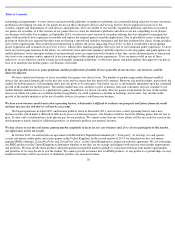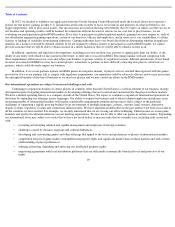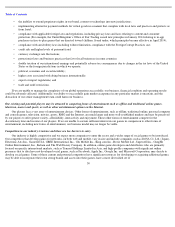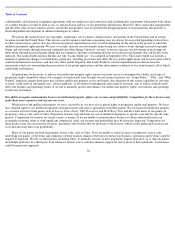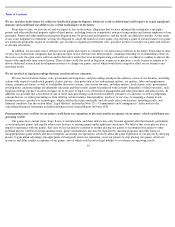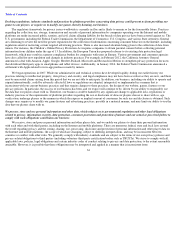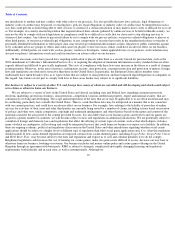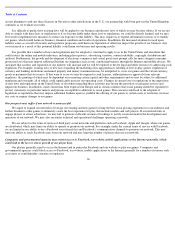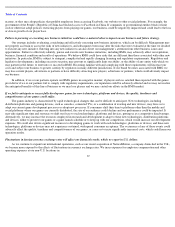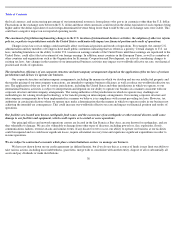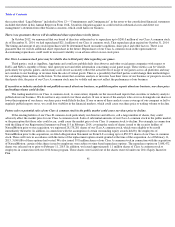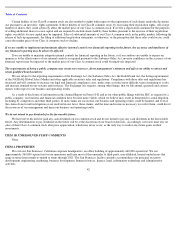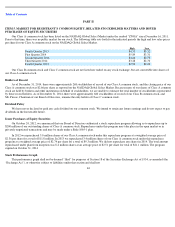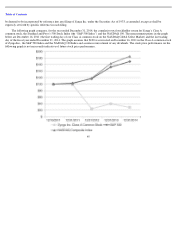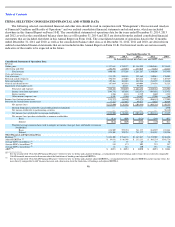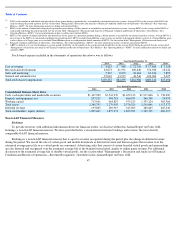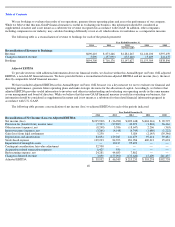Zynga 2014 Annual Report Download - page 41
Download and view the complete annual report
Please find page 41 of the 2014 Zynga annual report below. You can navigate through the pages in the report by either clicking on the pages listed below, or by using the keyword search tool below to find specific information within the annual report.
Table of Contents
the local currency, and an increasing percentage of our international revenue is from players who pay us in currencies other than the U.S. dollar.
Fluctuations in the exchange rates between the U.S. dollar and those other currencies could result in the dollar equivalent of such expenses being
higher and/or the dollar equivalent of such foreign-denominated revenue being lower than would be the case if exchange rates were stable. This
could have a negative impact on our reported operating results.
The enactment of legislation implementing changes in the U.S. taxation of international business activities, the adoption of other tax reform
policies, or policies in jurisdictions outside the United States could materially impact our financial position and results of operations.
Changes in tax laws or tax rulings could materially affect our financial position and results of operations. For example, the current U.S.
administration and key members of Congress have made public statements indicating that tax reform is a priority. Certain changes to U.S. tax
laws, including limitations on the ability to defer U.S. taxation on earnings outside of the United States until those earnings are repatriated to the
United States, could affect the tax treatment of our foreign earnings. In addition, many countries in the European Union, as well as a number of
other countries and organizations such as the Organization for Economic Cooperation and Development, are actively considering changes to
existing tax laws. Any changes in the taxation of our international business activities may impact our worldwide effective tax rate, our financial
position and results of operations.
The intended tax efficiency of our corporate structure and intercompany arrangements depend on the application of the tax laws of various
jurisdictions and on how we operate our business.
Our corporate structure and intercompany arrangements, including the manner in which we develop and use our intellectual property and
the transfer pricing of our intercompany transactions, are intended to optimize business efficiency as well as reduce our worldwide effective tax
rate. The application of the tax laws of various jurisdictions, including the United States and other jurisdictions in which we operate, to our
international business activities is subject to interpretation and depends on our ability to operate our business in a manner consistent with our
corporate structure and intercompany arrangements. The taxing authorities of the jurisdictions in which we operate may challenge our
methodologies for valuing developed technology or for transfer pricing on intercompany arrangements. Our existing corporate structure and
intercompany arrangements have been implemented in a manner we believe is in compliance with current prevailing tax laws. However, tax
authorities in certain jurisdictions where we operate may make a determination that the manner in which we operate results in our business not
achieving the intended tax consequences. This could increase our worldwide effective tax rate and impact our financial position and results of
operations.
Our facilities are located near known earthquake fault zones, and the occurrence of an earthquake or other natural disaster could cause
damage to our facilities and equipment, which could require us to curtail or cease operations.
Our principal offices and network operations centers are located in the San Francisco Bay Area, an area known for earthquakes, and are
thus vulnerable to damage. We are also vulnerable to damage from other types of disasters, including power loss, fire, explosions, floods,
communications failures, terrorist attacks and similar events. If any disaster were to occur, our ability to operate our business at our facilities
could be impaired and we could incur significant losses, require substantial recovery time and experience significant expenditures in order to
resume operations.
We are subject to contractual covenants which place certain limitations on how we manage our business.
We have not drawn down on our credit agreement (as defined herein), but if we do use this as a source of funds it may limit our ability to
take various actions, including incur indebtedness, grant liens, merge with or consolidate with another entity, dispose of all or substantially all
assets and pay dividends or make distributions.
38


